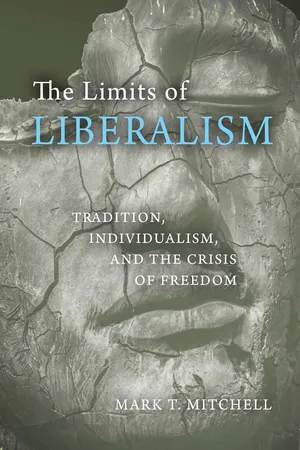
The Limits of Liberalism
Tradition, Individualism, and the Crisis of Freedom
- 354 pages
- English
- ePUB (mobile friendly)
- Available on iOS & Android
About This Book
In The Limits of Liberalism, Mark T. Mitchell argues that a rejection of tradition is both philosophically incoherent and politically harmful. This false conception of tradition helps to facilitate both liberal cosmopolitanism and identity politics. The incoherencies are revealed through an investigation of the works of Michael Oakeshott, Alasdair MacIntyre, and Michael Polanyi.
Mitchell demonstrates that the rejection of tradition as an epistemic necessity has produced a false conception of the human person—the liberal self—which in turn has produced a false conception of freedom. This book identifies why most modern thinkers have denied the essential role of tradition and explains how tradition can be restored to its proper place.
Oakeshott, MacIntyre, and Polanyi all, in various ways, emphasize the necessity of tradition, and although these thinkers approach tradition in different ways, Mitchell finds useful elements within each to build an argument for a reconstructed view of tradition and, as a result, a reconstructed view of freedom. Mitchell argues that only by finding an alternative to the liberal self can we escape the incoherencies and pathologies inherent therein.
This book will appeal to undergraduates, graduate students, professional scholars, and educated laypersons in the history of ideas and late modern culture.
Frequently asked questions
Information
NOTES
PREFACE
INTRODUCTION: Surveying the Landscape and Defining Terms
Table of contents
- Half Title
- Title Page
- Copyright
- Dedication
- Epigraph
- Contents
- Preface
- Acknowledgments
- Introduction: Surveying the Landscape and Defining Terms
- ONE The Seventeenth-Century Denigration of Tradition and a Nineteenth-Century Response
- TWO Michael Oakeshott and the Epistemic Role of Tradition
- THREE Alasdair MacIntyre’s Tradition-Constituted Inquiry
- FOUR Michael Polanyi and the Role of Tacit Knowledge
- FIVE The Incoherence of Liberalism and the Response of Tradition
- Afterword: A Conservatism Worth Conserving, or Conservatism as Stewardship
- Notes
- Bibliography
- Index